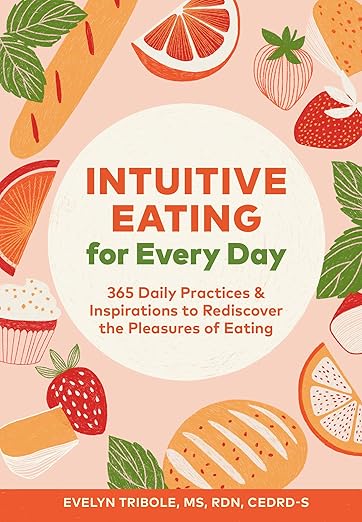Discovering the principles of intuitive eating is like finding a treasure map to a healthy and joyful relationship with food. Imagine a world where diets are a thing of the past, and you listen to your body’s wisdom to guide your eating. This is the essence of intuitive eating, a concept introduced by Evelyn Tribole and Elyse Resch in their groundbreaking book Intuitive Eating for Everyday.

The 10 principles of intuitive eating offer a revolutionary approach to establishing a healthy and respectful relationship with food. Here’s a summary that encapsulates the essence of each principle:
- Reject the Diet Mentality: Let go of the idea that diets work. They often lead to a cycle of failure and regained weight, which can damage your self-esteem.
- Honor Your Hunger: Listen to your body’s signals for food. Ignoring hunger can lead to overeating, so it’s important to eat when you’re hungry and stop when you’re full.
- Make Peace with Food: Stop viewing certain foods as ‘good’ or ‘bad.’ Give yourself permission to eat all foods without guilt, which can help reduce cravings and binge eating.
- Challenge the Food Police: The “food police” are the internalized rules and judgments about eating. Challenge these thoughts and remember that every food can fit into a balanced diet.
- Discover the Satisfaction Factor: Enjoy the pleasure of eating. Find foods that you truly enjoy and savor the experience of eating them.
- Feel Your Fullness: Pay attention to the sensation of fullness. It’s not about eating until you’re stuffed, but rather eating until you’re comfortably satisfied.
- Cope with Your Emotions with Kindness: Separate your emotions from food. Find other ways to cope with stress, anxiety, or sadness that don’t involve eating.
- Respect Your Body: Accept your body as it is and treat it with kindness. Every body is unique, and all bodies deserve respect and care.
- Movement—Feel the Difference: Engage in physical activity that you enjoy. Exercise shouldn’t feel like a chore; find activities that make you feel good and help you stay active.
- Honor Your Health with Gentle Nutrition: Make food choices that nourish your body and align with your health goals. Remember, it’s about overall patterns, not perfection in every meal.

These principles aim to help you reconnect with your body’s natural wisdom about eating, allowing you to find a balanced and sustainable way of nourishing yourself. Intuitive eating for life differs from mindful eating in that it focuses on the body’s internal cues rather than being solely present during eating. An intuitive eating nutritionist can help you integrate these principles into a balanced and satisfying diet.
To deepen your understanding, “The Intuitive Eating Workbook” provides practical exercises and guidance. You can also explore the intuitive eating hunger scale, which helps you tune into your body’s hunger signals.
Raising an intuitive eater starts with teaching children to listen to their bodies. As a parent, you can foster this by providing a variety of foods and encouraging them to eat according to their hunger and fullness cues.
If you’re looking for support, an intuitive eating coach can be a valuable resource. They can help you navigate the transition from dieting to intuitive eating
In conclusion, intuitive eating is a transformative approach to food and body relationships. It’s about honoring your body’s wisdom and making peace with food. By embracing these principles, you can cultivate a healthier, more fulfilling relationship with eating.




